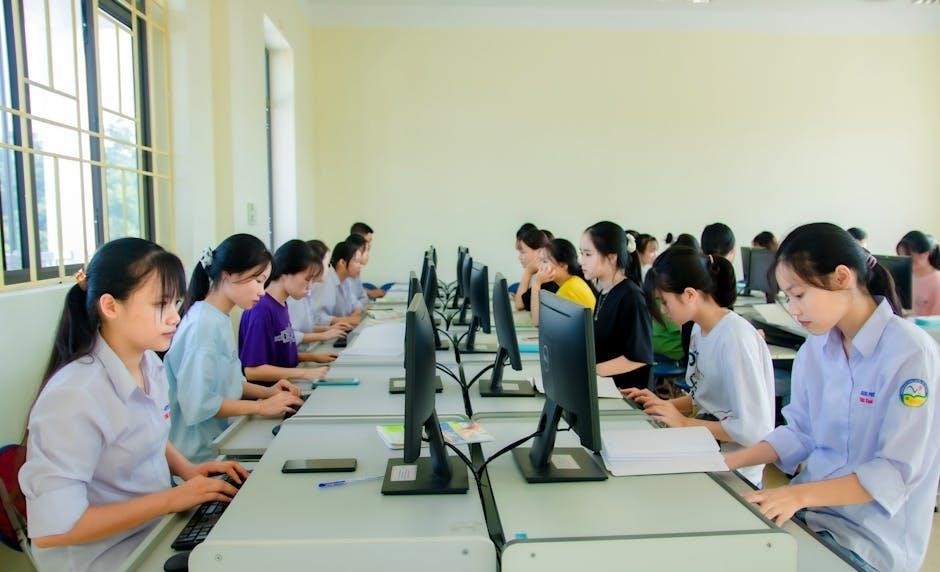Nursing informatics integrates technology and healthcare‚ transforming patient care. It bridges clinical expertise with digital tools‚ enhancing safety‚ efficiency‚ and decision-making. Essential for modern nursing practice and education.
Definition and Scope of Nursing Informatics
Nursing informatics is a field that integrates technology and healthcare to improve patient care. It focuses on managing health information and using technology to enhance clinical decision-making. The scope includes the development‚ implementation‚ and evaluation of information systems that support nursing practices. This field bridges nursing science with computer science‚ addressing challenges like data management‚ patient safety‚ and care coordination. It encompasses tools like electronic health records (EHRs) and telehealth platforms‚ ensuring efficient and evidence-based care delivery. Nursing informatics also emphasizes the ethical use of health data and promotes innovation in healthcare settings.
Historical Development of Nursing Informatics
Nursing informatics emerged in the 1960s‚ driven by the need to integrate technology into healthcare. Early systems focused on data collection and basic care documentation‚ laying the groundwork for modern advancements. The 1980s saw the development of the first nursing-specific information systems‚ such as the Total Nursing Information System (TNIS). Pioneers like Dr. Dee McGonigle played a pivotal role in defining the field and advocating for its growth. By the 2000s‚ nursing informatics had become a recognized discipline‚ with a focus on electronic health records (EHRs) and patient safety. Today‚ it continues to evolve‚ embracing artificial intelligence and telehealth innovations‚ shaping the future of healthcare delivery and education.

Nursing Informatics and the Foundation of Knowledge
Nursing informatics is a vital field integrating healthcare and technology. This section explores its core concepts‚ applications‚ and educational tools‚ shaping modern nursing education and practice.
Overview of the Book

Nursing Informatics and the Foundation of Knowledge is a comprehensive textbook designed for nursing students and professionals. Authored by Dee McGonigle and Kathleen Mastrian‚ it explores the history‚ current issues‚ and applications of nursing informatics. The book is divided into five sections‚ covering core concepts‚ information systems‚ and health information management. It emphasizes patient safety‚ meaningful use of technology‚ and innovations in the field. The fifth edition includes online access‚ offering enhanced learning tools. Available as a free PDF‚ this resource is ideal for those seeking to understand the integration of technology in nursing practice. It serves as a foundational guide for both students and practitioners in the evolving field of nursing informatics.
Key Features and Benefits for Nursing Students
Nursing Informatics and the Foundation of Knowledge offers tailored content for nursing students‚ providing a clear understanding of core informatics concepts. The book includes comprehensive chapters on electronic health records‚ data management‚ and information systems‚ essential for modern nursing practice. It emphasizes patient safety‚ meaningful use of technology‚ and future innovations‚ preparing students for real-world challenges. Available as a free PDF‚ it supports accessible learning. Supplementary materials and online access enhance engagement and understanding. This resource is ideal for students pursuing degrees from bachelors to doctor of nursing practice‚ offering a solid foundation in nursing informatics and its practical applications in healthcare settings.

Core Concepts in Nursing Informatics
Core concepts include electronic health records (EHRs) and data management systems‚ which are foundational to modern healthcare and nursing practice‚ ensuring efficient and accurate patient care.
Electronic Health Records (EHRs) and Data Management
Electronic Health Records (EHRs) are digital versions of patient charts‚ streamlining clinical workflows and improving care coordination. They enable secure‚ real-time access to patient data‚ reducing errors and enhancing decision-making. Data management in nursing informatics involves storing‚ organizing‚ and analyzing health information to support patient care and research. EHRs facilitate interoperability‚ allowing healthcare providers to share data across systems. Key features include documentation‚ order entry‚ and medication management. Effective data management ensures confidentiality‚ integrity‚ and accessibility of patient information. EHRs also support clinical decision-making through alerts‚ reminders‚ and evidence-based guidelines‚ ultimately improving patient outcomes and operational efficiency in healthcare settings.
Information Systems and Technology in Nursing
Information systems and technology are essential tools in modern nursing practice‚ enhancing efficiency and patient care quality. These systems streamline clinical workflows‚ improve communication‚ and support evidence-based decision-making. Technologies such as clinical decision-support systems‚ telehealth platforms‚ and mobile health applications enable nurses to access real-time patient data‚ monitor health trends‚ and deliver personalized care. Additionally‚ these tools facilitate collaboration among healthcare providers‚ ensuring comprehensive and coordinated care. The integration of technology in nursing also addresses challenges like data privacy and security‚ ensuring compliance with regulations. By leveraging these advancements‚ nurses can improve patient outcomes‚ reduce errors‚ and adapt to evolving healthcare demands effectively.
Applications of Nursing Informatics
Nursing informatics applies technology to enhance patient care‚ streamline workflows‚ and improve health outcomes. It supports data management‚ clinical decision-making‚ and effective communication in healthcare settings.
Health Information Management Systems
Health Information Management Systems (HIMS) are critical in nursing informatics‚ enabling secure storage‚ retrieval‚ and analysis of patient data. These systems ensure data accuracy‚ accessibility‚ and compliance with regulations. By integrating electronic health records (EHRs)‚ HIMS streamline clinical workflows‚ enhancing care coordination and patient outcomes. They support decision-making through real-time data access and analytics‚ reducing errors and improving efficiency. HIMS also facilitate interoperability across healthcare settings‚ ensuring seamless information sharing. As technology advances‚ these systems adapt to emerging needs‚ incorporating innovations like artificial intelligence and machine learning. Effective HIMS are vital for modern healthcare‚ supporting both clinical and administrative processes while maintaining patient privacy and data integrity.
Patient Safety and Meaningful Use of Technology
Patient safety is a cornerstone of nursing informatics‚ with technology playing a pivotal role in reducing errors and improving care outcomes. Meaningful use of technology ensures that electronic health records (EHRs) are used to enhance patient care coordination‚ improve communication‚ and empower patients. By leveraging EHRs‚ clinicians can access real-time data‚ reducing delays in diagnosis and treatment. Advanced systems incorporate clinical decision-support tools‚ alerting healthcare providers to potential errors or adverse events. Such technologies also promote personalized care plans‚ ensuring treatments align with individual patient needs. The integration of artificial intelligence and machine learning further enhances predictive analytics‚ aiding in early detection of complications; Together‚ these advancements foster a safer‚ more efficient‚ and patient-centered healthcare environment‚ aligning with the goals of nursing informatics to improve overall quality of care.

Future Directions in Nursing Informatics
The future of nursing informatics is driven by advancements in AI‚ machine learning‚ and big data‚ enhancing patient care through telehealth and personalized treatments.
Innovations and Emerging Trends
Nursing informatics is advancing rapidly‚ with innovations like artificial intelligence‚ machine learning‚ and the Internet of Medical Things (IoMT) transforming healthcare. These technologies enable real-time patient monitoring‚ predictive analytics‚ and personalized care plans. Emerging trends include telehealth expansion‚ blockchain for secure data sharing‚ and wearable devices for continuous health tracking. The integration of big data and natural language processing improves decision-making and streamlines workflows. such as voice assistants for clinical documentation. These advancements enhance patient safety‚ improve care coordination‚ and optimize resource allocation. The future of nursing informatics lies in seamless technology integration‚ fostering better outcomes and empowering healthcare professionals. The book highlights these trends‚ preparing nurses for a tech-driven healthcare landscape.
Role of Nursing Informatics in Advancing Healthcare
Nursing informatics plays a pivotal role in advancing healthcare by bridging clinical practice and technology. It enhances patient safety through accurate data management and evidence-based decision-making. By streamlining workflows and improving care coordination‚ nursing informatics optimizes healthcare delivery. It empowers nurses to use technology effectively‚ supporting personalized patient care and better health outcomes. The integration of informatics tools fosters collaboration among healthcare providers‚ reducing errors and improving communication. Additionally‚ it enables the analysis of large datasets to identify trends and improve population health. Nursing informatics is essential for addressing current healthcare challenges‚ making it a cornerstone of modern healthcare transformation and innovation.

Accessing the Book and Additional Resources
Access the book and additional resources effortlessly. Download the free PDF online or borrow it from your local library. Supplementary materials are available for enhanced learning.
Free PDF Download Options and Online Access
The book Nursing Informatics and the Foundation of Knowledge is widely available for free PDF download online. Students and professionals can access the full text through various platforms‚ ensuring easy learning. Many websites offer direct links to download the PDF version‚ making it convenient to study offline. Additionally‚ online access is provided through platforms like the Internet Archive‚ allowing readers to browse the content without downloading. Libraries also offer free access to the book‚ further expanding its reach. Supplementary materials‚ such as study guides and lecture slides‚ are often included to enhance understanding. This accessibility ensures that everyone can benefit from the comprehensive insights and foundational knowledge provided in the book.
Supplementary Materials for Enhanced Learning

Supplementary materials for Nursing Informatics and the Foundation of Knowledge include study guides‚ lecture slides‚ and interactive tools. These resources enhance understanding and practical application. Case studies and review questions reinforce key concepts‚ while discussion forums and multimedia content provide deeper insights. Additional resources‚ such as glossaries and practice exercises‚ are available online. Many platforms offer these materials for free‚ alongside the PDF download of the book. Educators and students can access these resources through the publisher’s website or online learning platforms. These materials ensure a comprehensive learning experience‚ supporting both individual study and classroom instruction. They are designed to complement the book and help learners master nursing informatics effectively.